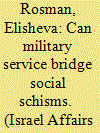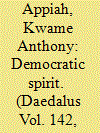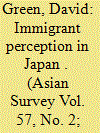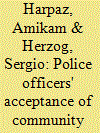| Srl | Item |
| 1 |
ID:
171680


|
|
|
|
|
| Summary/Abstract |
Can the military bridge social schisms? Conventional wisdom supports this assumption. However, it seems that, at best, the effect of military service on bridging social schisms and promoting social cohesion is limited. This article examines the extended effect of contact hypothesis in the military, both in practice and as an element capable of bringing about a change in veterans’ thinking. It asks: are veterans who had diverse friendships during their service more likely to have diverse friendships in the future? If so, do they attribute their ability and willingness to include others within their ingroup to their military service? Based on findings from a study of Israeli college and university students, the article demonstrates that while indeed service friendships may be short lived, service alongside members of outgroups has certain longer-term effects and influences the social perception of veterans. Social messages can be both positive and negative and teach veterans the limits of redrawing social boundaries.
|
|
|
|
|
|
|
|
|
|
|
|
|
|
|
|
| 2 |
ID:
121057


|
|
|
|
|
| Publication |
2013.
|
| Summary/Abstract |
There is a famous paradox about democracy: most forms of participation make no obvious difference to political outcomes and yet people act anyway. I argue that they are more likely to act politically if they have certain attitudes and commitments; and that productive attitudes of the right kind can be sustained by a culture in which two kinds of honor are central. One kind of honor is collective: it is the honor of nations, which is the concern of the patriot. Another is the honor of citizens, who are worthy of respect because they contribute to the practices that serve the republic. I suggest some practices we Americans might want to take up and honor for the sake of our own republic today, drawing attention to two discoveries in social psychology that could be productively brought to bear in our political life: namely, the Ben Franklin effect and the Contact Hypothesis.
|
|
|
|
|
|
|
|
|
|
|
|
|
|
|
|
| 3 |
ID:
102513


|
|
|
|
|
| Publication |
2011.
|
| Summary/Abstract |
In the past few decades, planned contact interventions between groups in conflict have played an important role in attempts at improving intergroup relations and achieving peace and reconciliation. This article focuses on such reconciliation-aimed intergroup encounters between Israeli Jews and Palestinians that seek to reduce hostility and increase understanding and cooperation between the two nationalities. Like other contact interventions conducted in settings of intergroup conflict, encounters between Israeli Jews and Palestinians represent a paradoxical project: this is a project that aspires to generate equality and cooperation between groups that are embedded in a protracted asymmetrical conflict. Though existing research teaches us valuable lessons on the effectiveness of contact conducted under optimal conditions, little is said about contact between groups involved in asymmetrical protracted dispute. The goal of this analysis is to examine the evolution of reconciliation-aimed contact interventions between Israeli Jews and Palestinians in the past 20 years. The research method is qualitative, relying on ethnographic data assembled during the relevant period of time. The findings identify and trace the evolution of four major models of Jewish-Palestinian planned encounters: the Coexistence Model, the Joint Projects Model, the Confrontational Model, and the Narrative-Story-Telling Model. The strengths and limitations of each model in transforming intergroup attitudes in asymmetric conflict are discussed.
|
|
|
|
|
|
|
|
|
|
|
|
|
|
|
|
| 4 |
ID:
152271


|
|
|
|
|
| Summary/Abstract |
Japan’s rapidly aging populace and its accompanying demographic, social, and economic problems are forcing a gradual opening to increased immigration. This paper consequently considers what factors influence public opinion toward immigration in Japan, using multilevel statistical modeling to test hypotheses regarding economic threat, cultural threat, contact, and salience of change.
|
|
|
|
|
|
|
|
|
|
|
|
|
|
|
|
| 5 |
ID:
118388


|
|
|
|
|
| Publication |
2013.
|
| Summary/Abstract |
Police racism and prejudice against minorities are believed to impede law enforcing agencies' ability to equitably perform their job. One factor driving police forces throughout the world to adopt community policing was their will to ameliorate relations with minority groups. In the Israeli case, a survey of 643 police officers and police managers reveals that positive attitudes towards community policing correlate with positive attitudes towards Arab citizens. This article discusses these findings and their implications.
|
|
|
|
|
|
|
|
|
|
|
|
|
|
|
|